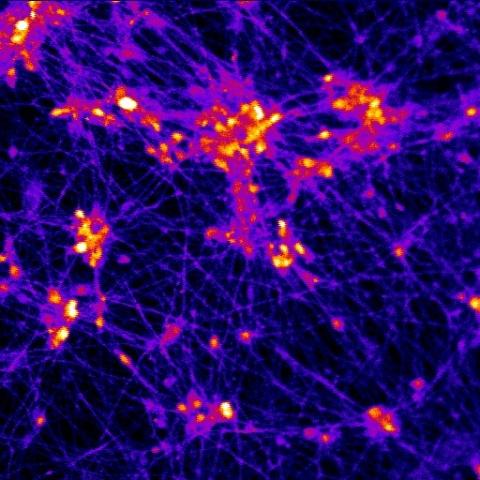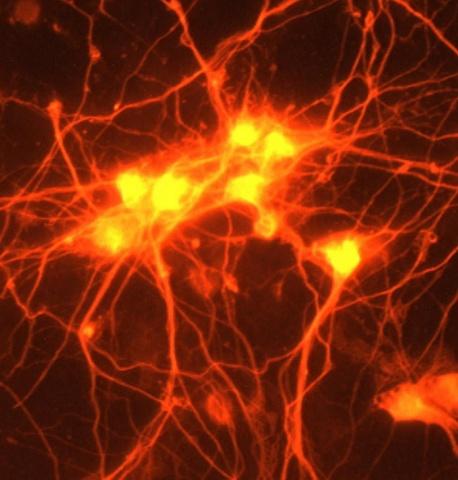Our Duke Parkinson's and Movement Disorders Newsletter provides free news, interviews, and resources for individuals with movement disorders and their care partners.
Sign up to receive the newsletter.
Staff Spotlight: Eleanor Wood
For Eleanor Wood, every day is arm day. As a transcranial magnetic stimulation (TMS) technician in the lab of Noreen Bukhari-Parlakturk, MD, PhD, she helps keep 10 pound TMS coils within half a millimeter of their target range. Wood also works in Duke University’s Opti Lab and Brain Stimulation Research Center where she helps conduct other TMS research and engineer new TMS technologies. For this week’s spotlight interview, the recent Duke graduate talks to us about what she enjoys about each of these jobs.
Duke Neurology Research Round Up, October 2020
This September, members of the Duke Neurology Department contributed to 26 new studies, advancing our knowledge of neuroscience at the subcellular, national, and global levels. Ornit Chiba-Falek, PhD, and Laurie Sanders, PhD, lead studies that answered questions about the genetic origins of Parkinson’s disease and its connection to some forms of breast cancer.
Staff Spotlight: Crystal Ballard
One year after coming to our Morreene Road Clinic, Crystal Ballard still enjoys the challenges and opportunities that come with her work. Each day her job involves supporting our neurology providers, supervising staff assistants, preparing patients for clinic and other tasks. For this week’s “Spotlight” interview, Ballard talks to us about this work, her various positions at Duke over the past 20 years, and embracing and adapting to the challenges brought on by the COVID-19 pandemic.
Colleagues surprise social worker of the year
Clinical social worker Allison Allen, MSW, LCSW, is a member of the committee that plans the annual Social Worker of the Year award celebration. She thought it was odd she hadn't heard how the department would recognize this year's recipient virtually. That's because she was the 2020 awardee.
“We were having our weekly virtual check-in and I realized my bio was being read," Allen said. “My husband then entered our home office with our kids and presented me the award. Previous winners are my mentors, so it was humbling to be this year's recipient."
Duke Neurology Research Round Up, August 2020
Members of the Duke Neurology Department contributed to 14 new peer-reviewed articles published this July, improving our understanding of neuroscience, charting a course for research in a post-COVID-19 world, and offering opportunities for advancing patient care. Simon Gregory, PhD, and Yong Chen, PhD, respectively co-authored articles offering new therapeutic avenues for muscle repair and chronic pain treatment. Wuwei “Wayne” Feng, MD, MS, was part of a consortium examining the impact of COVID-19 on the NIH’s StrokeNet and offering a vision for resuming clinical trials.
Calakos, La Spada awarded distinguished professorships
Nicole Calakos, MD, PhD, and Al La Spada, MD, PhD, have been awarded distinguished professorships from Duke University. Duke University awarded distinguished professors to 28 faculty members this year, with 12 coming from the School of Medicine. Distinguished professorships are awarded to faculty who have demonstrated extraordinary scholarship in advancing science and improving human health.
Shroff, Chen win Duke's "Outstanding Senior Thesis in Neuroscience" Award
Two undergraduate students working in labs in the Duke Neurology Department were joint recipients of Duke’s 2020 “Outstanding Senior Thesis in Neuroscience” award. Kunal Shroff worked for three years in the lab of Nicole Calakos, MD, PhD, where he studied the molecular mechanisms underlying DYT1 dystonia. Vivian Chen worked in the lab of Ornit Chiba-Falek, MD, PhD, where she helped examine the genetic processes underpinning Alzheimer’s and other age-related neurodegenerative diseases.
Staff Spotlight: Lacy Rardin, MSW, LCSWA
Before the COVID-19 pandemic, Lacy Rardin, MSW, LCSWA, helped families with movement or memory disorders cope with their diagnosis, find support, and navigate life with their conditions in our Morreene Road Clinic. Now, she’s providing the same resources and help to those patients virtually via telephone or video calls.
Staff Spotlight: Nina Willis
Nina Willis had been working at our Movement Disorders Clinic at Morreene Road for almost a decade when the COVID-19 epidemic reached the United States. Now she’s helping patients with movement disorders get the care they need via telehealth. In this week’s “spotlight” interview, Willis talks to us about how her work has changed over the past month, how the new telehealth visits are benefiting patients, and how her faith and her colleagues help her get through difficult times.
Duke Neurology Research Round Up, March 2020
This February, members of the Duke Department of Neurology contributed to 10 new research articles in peer-reviewed journals. At the microscopic level, new studies examined how ion channels in endothelial cells may contribute to hypertension associated with obesity, and reviewed how DNA damage contributes to neuronal death in Parkinson’s disease. And at the system-wide level, our Stroke team discussed the massive IMPROVE Stroke Care project, which includes a network of nearly 100 hospitals, and hundreds of other agencies and communities.







